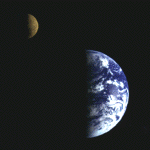Soundtracks:
þBattlestar Galactica
How to Get Ahead in Advertising
Right Stuff





|
The Planets, suite for large orchestra and voices
Opus 32
 Being
a passionate lover of mysticism and astrology, Holst combined his hobby
into the music he wrote. Holst was not a regular musician. He did not compose
big works like concertos and symphonies, and he did not even compose a
lot of chamber music. He composed various pieces, and this is the most
famous one of them all. He used a grand orchestra in order to describe
the planets of our solar system, through the most amazing orchestral effects. Being
a passionate lover of mysticism and astrology, Holst combined his hobby
into the music he wrote. Holst was not a regular musician. He did not compose
big works like concertos and symphonies, and he did not even compose a
lot of chamber music. He composed various pieces, and this is the most
famous one of them all. He used a grand orchestra in order to describe
the planets of our solar system, through the most amazing orchestral effects.
In this suite, he dedicates a symphonic poem to each
one of the planets, and one of his friends told once that after he immortalized
his astronomic hobby in his music, Holst grew out of interest in Astronomy
at all.
The order of poem is as follows:
|
Mars (war)þþ
|
The cruel, unmerciful war god; some people say Holst
was affected by the First World War and its horrors when he wrote this
piece.
|
|
Venus (peace)þ
|
A complex, calm description of peace.
|
|
Mercury (a winged deliverer)
|
Short and bight.
|
|
Jupiter (joy)
|
A sort of a jumpy, joyful fair, full of playful folk
tunes.
|
|
þSaturn (old age)
|
Presents old age, bringing regret and remorse but also
the wisdom of the elderly.
|
|
Uranus (wizard)þ
|
Dazzles those who see him (or hear him...) in the magic
tricks he makes.
|
|
Neptune (mystery)þ
|
A woman choir singing mysteriously, slightly frighteningly,
and with barely no words.
|
The planet Pluto was only discovered 20 years after this
piece was written, and so it was not included in the orchestral suite "The
Planets".
The impressive work Holst composed is, with no doubt,
one of the best programme pieces in the classical repertory; alongside
Mussorgski's "Picture at an Exhibition", and the "Four Seasons"
presented by Vivaldi, it offers a fascinating example of painting in sounds,
as an accomplished composer should be able to create.
|